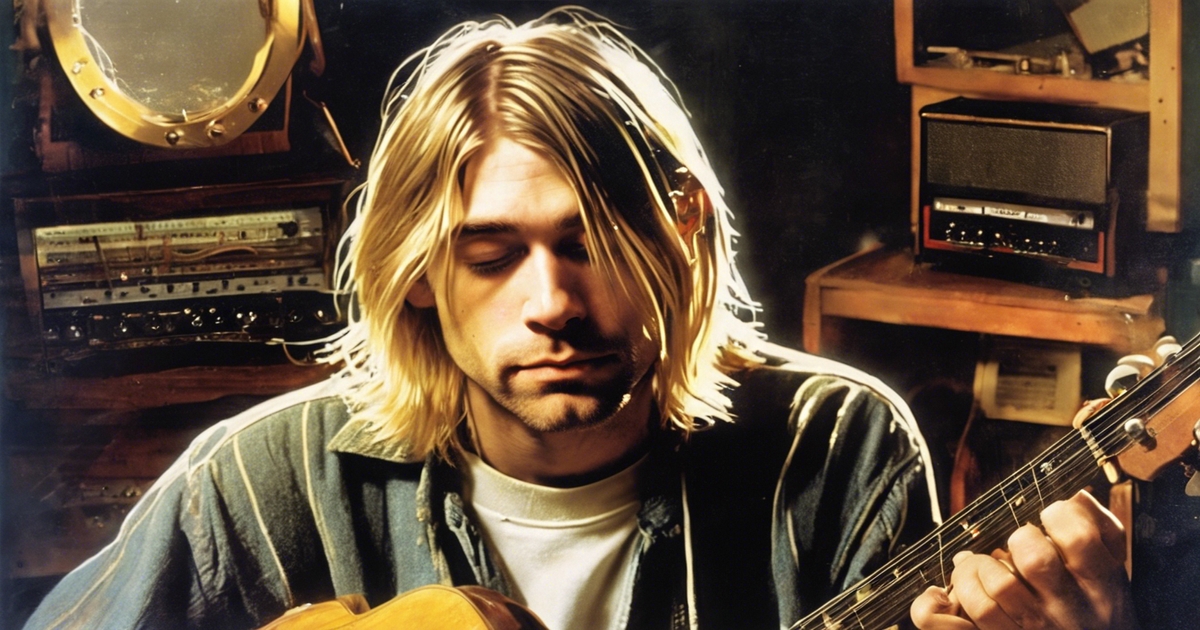Why Did Kurt Cobain Hate ‘Smells Like Teen Spirit’? Unveiling the Truth
-
-
What was the impact of “Smells Like Teen Spirit” on Nirvana’s career?
-
How did Kurt Cobain view the balance between artistry and commercial success?
-
What role did misinterpretation by fans play in Kurt Cobain’s feelings towards the song?
-
What is the cultural significance of “Smells Like Teen Spirit” despite Kurt Cobain’s dislike?
Unveiling the enigma: Why did Kurt Cobain harbor disdain towards “Smells Like Teen Spirit”? Delve into the paradoxical relationship between the iconic anthem and its creator. While fans reveled in its raw energy and rebellious spirit, Cobain’s sentiments towards the track remained complex and conflicted. Unravel the layers of this musical mystery to grasp the profound reasons behind his aversion.
Discover the untold story behind one of Nirvana’s most celebrated songs, exploring the intricate emotions that fueled Cobain’s ambivalence towards its success. Peer beyond the surface of rock stardom to uncover a narrative rich in contradictions and revelations. Join us as we dissect the compelling saga of artistic divergence and personal turmoil that shaped Cobain’s tumultuous connection with “Smells Like Teen Spirit.”
Key Takeaways
- Understanding the origins of Kurt Cobain’s discontent with “Smells Like Teen Spirit” sheds light on the complexities of artistic expression and personal struggles.
- To appreciate Cobain’s artistic vision, consider the tension between commercial success and creative integrity that influenced his music.
- The impact of “Smells Like Teen Spirit” on Nirvana’s career highlights the dichotomy between mainstream success and artistic authenticity in the music industry.
- Recognizing the burden of repetition faced by artists like Cobain underscores the challenges of maintaining originality and relevance in a constantly evolving musical landscape.
- Misinterpretation by fans can distort the true intentions behind a song, emphasizing the importance of understanding an artist’s perspective before forming judgments.
- Despite his dislike for the song, “Smells Like Teen Spirit” became a cultural phenomenon, showcasing the disconnect between personal preferences and public reception in the music industry.
Origins of the Discontent
Song Creation
Nirvana’s hit “Smells Like Teen Spirit” originated from a casual jam session among band members. Inspired by Kathleen Hanna’s feminist movement, the song carried a rebellious spirit. The track was recorded in just a few takes, capturing the raw energy of the band.
Initial Popularity
The song’s surprising rise to fame caught Nirvana off guard, launching them into mainstream success. With unexpected chart success, “Smells Like Teen Spirit” became an anthem for a generation. The iconic music video impact added visual power to the song’s already explosive popularity.
Personal Reflections
Kurt Cobain expressed mixed feelings towards the song that defined their career. He grappled with conflicted emotions towards fame, struggling with the pressures it brought. The immense success of “Smells Like Teen Spirit” had a profound impact on Nirvana’s trajectory, shaping their future endeavors.
Cobain’s Artistic Vision
Authenticity
Kurt remained committed to his artistic integrity, prioritizing raw emotion over commercial success. He rejected mainstream expectations, staying true to his punk roots.
Resisting external pressures, he fought against the commodification of his music, ensuring it reflected his true self. Despite record label demands, he stayed authentic.
Musical Influences
Drawing from punk and alternative rock, Kurt melded genres to create a unique sound. Sonic Youth’s experimental approach deeply influenced him.
His eclectic taste and rebellious spirit shaped the grunge movement, infusing it with raw energy and emotional depth.
Rebellion
“Smells Like Teen Spirit” embodied an anti-establishment sentiment, challenging societal norms. Kurt’s lyrics resonated with a generation disillusioned by conformity.
Impact on Nirvana’s Career
Mainstream Success
Nirvana faced a pivotal moment in their career, balancing their underground roots with mainstream appeal. “Smells Like Teen Spirit” served as an unexpected crossover hit, propelling the band into the limelight. This iconic track played a crucial role in redefining rock music in the 90s.
Media Attention
The release of “Smells Like Teen Spirit” brought intense scrutiny from the media towards Nirvana. Kurt Cobain, the band’s frontman, found himself under a harsh spotlight, leading to detrimental effects on his mental health. The constant struggles with paparazzi intrusion added immense pressure to an already fragile situation.
Fan Base Expansion
With the explosive success of “Smells Like Teen Spirit,” Nirvana began attracting a diverse audience beyond their original fan base. The song resonated deeply with disaffected youth, striking a chord with its raw energy and rebellious spirit. This newfound connection led to the band cultivating a loyal fan base that transcended traditional boundaries.
The Burden of Repetition
Overplayed Song
Radio stations faced challenges due to the saturation of “Smells Like Teen Spirit,” impacting its initial reception. Despite its success, overplaying led to listener fatigue.
The song’s legacy was affected by its constant presence, overshadowing Nirvana’s diverse discography. Balancing the need for airplay with artistic integrity became a struggle for the band.
Nirvana navigated the fine line between popularity and maintaining their musical identity. The overplayed nature of the song raised questions about artistic compromise.
Setlist Expectations
Fans expected to hear “Smells Like Teen Spirit” at every concert, posing a challenge for Nirvana to balance fan favorites with new material.
Meeting audience demands while evolving as artists was a delicate task for Nirvana, especially when it came to live performances.
The evolution of Nirvana’s live shows reflected their growth as musicians, showcasing a shift from reliance on hits towards experimenting with new sounds.
Misinterpretation by Fans
Lyrics Misunderstood
Fans often misinterpret “Smells Like Teen Spirit,” failing to grasp its true message. The lyrics are not a celebration but a critique of the mainstream culture and its emptiness. Hidden meanings in the song reveal Cobain’s disdain for commercialization and conformity.
Misaligned Ideologies
There’s a stark clash between the rebellious essence of the song and its widespread adoption by the mainstream. The commercialization of the track contradicts Cobain’s original intention, leading to a disconnect. Navigating through these conflicting interpretations sheds light on the complexities within Cobain’s artistry.
The Cultural Phenomenon
90s Rock Landscape
The 1990s saw a significant shift in the dynamics of the music industry, with alternative rock gaining prominence. Grunge emerged as a raw and authentic genre, challenging the polished sounds of mainstream rock. Nirvana, led by Kurt Cobain, played a pivotal role in this transformation.
Nirvana’s album “Nevermind” catapulted them to fame and reshaped the music scene. Their sound was characterized by raw emotion and gritty guitar riffs. This departure from the glam and excess of 80s rock resonated with disillusioned youth seeking authenticity.
The rise of grunge marked a departure from the flashy and superficial nature of mainstream rock. Bands like Pearl Jam, Soundgarden, and Alice in Chains joined Nirvana in defining the grunge movement. Their music spoke to a generation disillusioned with societal norms and yearning for something real.
Youth Anthem
“Smells Like Teen Spirit” became an anthem for disenchanted youth, capturing the spirit of teenage rebellion. Released in 1991, the song’s explosive energy and raw lyrics struck a chord with listeners worldwide. Its iconic riff and Cobain’s anguished vocals embodied the frustrations of a generation.
The song’s success was unexpected, propelling Nirvana to superstardom overnight. Despite its commercial triumph, Cobain grew resentful of its mainstream appeal. He felt that it misrepresented the band’s ethos and pigeonholed them as one-hit wonders.
“Smells Like Teen Spirit” empowered a generation to embrace their individuality and reject conformity. Its rebellious spirit made it a rallying cry for those grappling with societal pressures. The song’s success highlighted Cobain’s inner conflict between artistic integrity and commercial success.
Legacy Despite Dislike
Influential Track
“Smells Like Teen Spirit” revolutionized rock music in the early 90s, setting new standards for the genre. The raw energy and rebellious spirit of the song captivated a generation of disenchanted youth. Kurt Cobain’s raw vocals and the explosive guitar riffs created a unique sound that resonated with listeners worldwide.
This iconic track not only influenced the grunge movement but also inspired future generations of musicians across various genres. Its impact on alternative rock was profound, shaping the course of music history for years to come. Despite Cobain’s personal feelings towards the song, its significance in popular culture remains undeniable.
Cover Versions
Numerous artists have reimagined “Smells Like Teen Spirit,” showcasing its versatility and enduring appeal. From acoustic renditions to heavy metal covers, each interpretation adds a new dimension to the song’s legacy. These diverse versions highlight the timeless quality of Cobain’s songwriting and Nirvana’s musical legacy.
The evolution of “Smells Like Teen Spirit” through cover versions reflects its lasting impact on the music industry. Artists from different backgrounds and genres continue to pay homage to this groundbreaking track, keeping its spirit alive for new audiences to discover and appreciate.
Modern Relevance
Despite being released over two decades ago, “Smells Like Teen Spirit” maintains its relevance in contemporary culture. The song’s themes of teenage angst, rebellion, and disillusionment still resonate with listeners today. Its influence on current music trends is evident in the continued popularity of grunge-inspired bands and alternative rock acts.
The enduring legacy of “Smells Like Teen Spirit” lies in its ability to transcend time and connect with audiences across generations. As a cultural touchstone, the song continues to inspire artists and listeners alike, cementing its status as a timeless classic in music history.
Artist vs. Commercial Success
Creative Control
Artists like Kurt Cobain often struggled with maintaining their artistic vision amidst commercial pressures. The clash between artistic integrity and label demands was a constant battle for Nirvana.
Balancing the need for commercial success with personal expression proved challenging for Cobain. The pressure to produce hits like “Smells Like Teen Spirit” while staying true to his art created internal conflict.
This struggle had a significant impact on Nirvana’s creative process. The band’s dynamics were influenced by the tension between artistic freedom and commercial viability, shaping their music and overall direction.
Industry Pressures
Navigating the commercial expectations set by the music industry was a daunting task for Cobain. The success of “Smells Like Teen Spirit” catapulted Nirvana into the mainstream, altering their trajectory.
The challenges of fame weighed heavily on Cobain, affecting his ability to maintain artistic freedom. The demands of record labels and fans often clashed with his desire to create music authentically.
Resisting industry manipulation became increasingly difficult as Nirvana’s popularity soared. Cobain’s disdain for the commercialization of their music fueled his dislike for “Smells Like Teen Spirit.”
Cobain’s Complex Relationship with Fame
Personal Struggles
Kurt Cobain grappled with intense internal conflicts, battling feelings of inadequacy and self-doubt daily. His struggles extended beyond the stage, impacting his personal life significantly. The pressures of fame and success weighed heavily on his shoulders, leading to a constant state of turmoil.
Facing mental health challenges, Cobain struggled with depression and anxiety, seeking solace in music as an outlet for his innermost thoughts and emotions. The raw authenticity in his lyrics often reflected the depths of his emotional struggles, resonating with fans on a profound level.
The impact of Cobain’s personal turmoil was evident in his music, infusing it with raw emotion and vulnerability that transcended mere entertainment. His songs became anthems for a generation grappling with similar issues, creating a deep connection between artist and audience.
Public Persona
Kurt Cobain’s complex public image painted a picture of contradictions – a reluctant rock star who shunned the trappings of fame while being thrust into the spotlight. Despite his aversion to celebrity status, he found himself at the forefront of the grunge movement, becoming an icon almost against his will.
The media portrayal of Cobain often sensationalized his struggles, reducing him to a troubled artist defined by his demons rather than his talent. This skewed representation created a disconnect between the public perception of Cobain and the reality of the man behind the music.
Cobain’s legacy extends far beyond the confines of the music industry, shaping how society views mental health and artistic expression. His unapologetic approach to songwriting and performance paved the way for future artists to embrace their vulnerabilities openly, inspiring a new wave of musicians unafraid to confront their innermost demons through their art.
Summary
Reflect on the complexities of Kurt Cobain’s relationship with “Smells Like Teen Spirit.” Understand how his artistic integrity clashed with commercial success, leading to a legacy that transcends mere like or dislike. Consider the broader implications of artistic authenticity versus mainstream appeal in the music industry. Explore how misinterpretations by fans and the burden of repetition shaped Nirvana’s career and Cobain’s perception of fame.
In your own pursuits, remember to stay true to your vision, even if it means facing challenges along the way. Embrace the nuances of creativity and success, recognizing that authenticity often outlasts fleeting trends. As you navigate your path, draw inspiration from Cobain’s journey, finding strength in staying genuine to yourself despite external pressures.
Frequently Asked Questions
Why did Kurt Cobain hate “Smells Like Teen Spirit”?
Kurt Cobain grew to dislike “Smells Like Teen Spirit” due to its overwhelming commercial success, leading to misinterpretation by fans, burden of repetition in performances, and conflict with his artistic vision.
What was the impact of “Smells Like Teen Spirit” on Nirvana’s career?
“Smells Like Teen Spirit” propelled Nirvana to mainstream success, defining their legacy despite Cobain’s personal dislike. It marked a shift in their career, leading to heightened fame and influence in the music industry.
How did Kurt Cobain view the balance between artistry and commercial success?
Cobain struggled with maintaining artistic integrity while achieving commercial success. His complex relationship with fame influenced his views on balancing creativity with the pressures of the music industry.
What role did misinterpretation by fans play in Kurt Cobain’s feelings towards the song?
Misinterpretation by fans contributed to Cobain’s disdain for “Smells Like Teen Spirit.” As the song became an anthem for a generation, its original meaning was lost, adding to his frustration and disillusionment.
What is the cultural significance of “Smells Like Teen Spirit” despite Kurt Cobain’s dislike?
Despite Cobain’s personal feelings towards the song, “Smells Like Teen Spirit” remains a cultural phenomenon that defined a musical era. Its impact on grunge music and popular culture endures, highlighting its lasting legacy.







